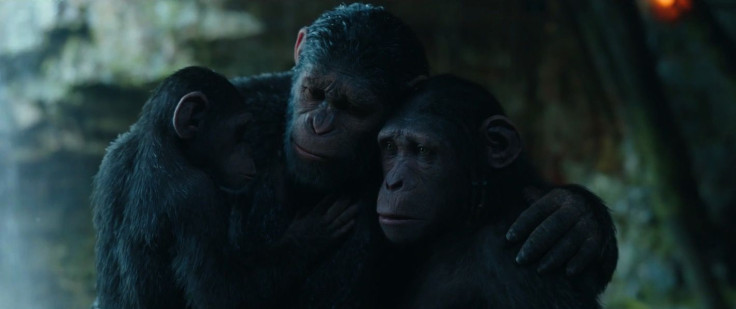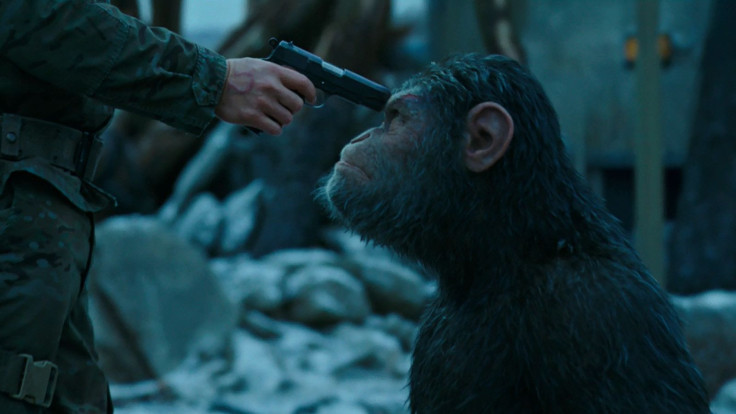2011’s Rise of the Planet of the Apes was the summer blockbuster equivalent of one of those videos of some high school kid hurling a basketball across the court at the buzzer and sinking it. Tim Burton’s 2001 Planet of the Apes had already demonstrated the difficulty of rebooting the landmark 60s and 70s series. But Rise succeeded by rebuilding the basic assumptions of the series, taking a scattershot satire franchise and transforming it into an intensely focused, deadly serious character study of the revolutionary leader Caesar. Dawn of the Planet of the Apes built an ape society and tore it down before our eyes, as Caesar and his nascent utopia weathered their first political schism and exploded a touchy diplomatic situation with a human colony. To come so far in two movies, to take seriously a strange future (to the extent that we can see ourselves in it), makes the new Planet of the Ape series a huge success. But after two fantastic entries, the rejuvenated series finally tips over into ponderous self-absorption with its latest, War for the Planet of the Apes.
War for the Planet of the Apes is beautiful. Opening just outside the forest redoubt of Caesar and his besieged society, War looks like Ansel Adams got shoved into The Fly telepod with Michael Bay. Colors are muted, but director Matt Reeves and cinematographer Michael Seresin put landscape to uses that reveal just how silly all those Peter Jackson helicopter shots were. Ranging over lush Pacific Northwest rainforests, forlorn beaches, abandoned villages and yeah, Monument Valley too, War is also a remarkable piece of Americana. Not in the iconic sense, like Colonel Taylor falling before the decimated Statue of Liberty, but in a quieter spirit. The apes have an opportunity to build something great here, in our ruins.
Until it gets to the labor camp. Many positive elements of War for the Planet of the Apes could end with that caveat: until it gets to the labor camp. There will be discussions of the plot, so consider this the spoiler warning.
War for the Planet of the Apes’ first battle is seen from the human perspective this time, as fighters in a fanatical military faction, united under The Colonel (Woody Harrelson), try to take an ape fort. Even opening with crippling firepower, the professional army is soon overwhelmed by the apes. They not only have the high ground, but are cavalry experts and masters of the land, wielding spears, arrows, guns and homemade explosives. We witness different command structures and tactics, implying radically different societies. But it’s after the battle, when the apes memorialize their dead and return to their families, that the stakes become clear: they are fighting for their civilization and it’s not going well. The apes are united by a common philosophy, “Apes Together Strong,” but the revolutionary power of the idea is crumbling under external pressure. This is good stuff.

Then The Colonel conducts a daring midnight raid and kills Caesar’s family. It’s a fridging. Rather than taking time to build out its fascinating society, War pulls out the rug and hands Caesar the same motivation as Charles Bronson in Death Wish, Thomas Jane in The Punisher, Dolph Lundgren in The Punisher and every other action hero for the past 30 or 40 decades.
When Caesar finds The Colonel and his Alpha-Omega militia (a nod to the bomb-worshipping mutants of Beneath the Planet of the Apes and Battle for the Planet of the Apes), his apes have already been captured in what Dobby Bad Ape (Steve Zahn) calls a “human zoo,” where the quarantined, sick with simian flu, were once detained. Caesar as much as turns himself in. War for the Planet of the Apes has arrived at the labor camp.
The Colonel is using the apes, kept in big outdoor pens like the super pigs of Okja (our review), as slave labor to Build The Wall. And here War for the Planet of the Apes takes a turn from what you’ve likely imagined to be the primary conflict. Because the titular war isn’t really between apes and humans. Instead, the apes have arrived at the labor camp to bear witness to man’s destruction of man.
The simian flu has mutated and re-infected humans are becoming mute, their mental faculties diminishing to a more animal state (though Nova, a mute human child adopted by Maurice, suggests humans will remain capable of a great deal). To Taylor, it’s a time for total war. The infected must be killed along with the apes, who challenge mankind’s primacy on the Earth. Some other human faction disagrees. By the end they will destroy each other.
War for the Planet of the Apes follows what the apes get up to in the meantime, as humanity’s final judgment approaches. This comes in two flavors, both unfulfilling. The first and primary is Caesar’s ascension to a state of holiness. Subjected to a gauntlet of Biblical cruelties — scourged, starved and crucified — Caesar stands as final witness to mankind’s sad fate. We don’t comport ourselves well. By the end Caesar is more Moses than Christ-figure. The other, reduced to practically a sitcom B-plot, is the ape’s escape from the labor camp.
Both halves of the ape’s time in the labor camp short-circuit the other. The escape, largely dependent on a tunnel Bad Ape literally falls into, is so perfunctory and straightforward, so rife with evidence of The Colonel and his army’s incompetence, that it undermines the drama of Caesar’s defiance. Too much feels like genre shorthand, depending on gestures in the direction of The Bridge on the River Kwai, Ben-Hur (though its depiction of martyr suffering is closer to Martin Scorsese’s underseen Silence), Apocalypse Now, The Grand Illusion and The Great Escape to carry us over the flimsy expanse of War for the Planet of the Apes’s second half.
Caesar remains a great character and the apes are as magnetic and characterful in this as in Dawn of the Planet of the Apes, but we’ve seen, a thousand times in a thousand movies, everything thrown against them, right down to the traitor ape who Caesar returns to the side of the heroes through his stoic example. Just like Dawn, War is superbly crafted, bold in its world-building and well-acted (at least the apes — Harrelson’s Kilgore cosplay never feels threatening), but there’s a hollow center the movie asks us to fill with the familiar plot beats we’ve brought with us into the theater. Much of what the apes get up to, Caesar included, feels like busywork. As Biblical, world-historical events swirl around them, the apes bide their time literally throwing shit and looking the wrong way through binoculars.
War for the Planet of the Apes upholds a tradition of overstuffed, self-indulgent trilogy cappers. The arc of the series thus far is most like Nolan’s Batman series — a fun origin story sets up a rich, sprawling second entry, then collapses into a navel-gazing third entry too obsessed with the underlying meaning of its protagonist to worry about the minute mechanisms of a good story. Caesar’s promotion to legendary figure comes too soon, resulting in a disconnect between the grandeur of War for the Planet of the Apes’ vision and the clipped, perfunctory way events combine to bring this war to its final reckoning.
- stunning special effects and worldbuilding
- Caesar and his apes are as magnetic as ever
- Apes have little to do, saddled with an uninspired plot
- The villain is a riff on better movies



















